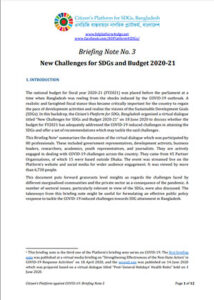 The national budget for fiscal year 2020-21 (FY2021) was placed before the parliament at a time when Bangladesh was reeling from the shocks induced by the COVID-19 outbreak. A realistic and farsighted fiscal stance thus became critically important for the country to regain the pace of development activities and realise the visions of the Sustainable Development Goals (SDGs). In this backdrop, the Citizen’s Platform for SDGs, Bangladesh organised a virtual dialogue titled “New Challenges for SDGs and Budget 2020-21” on 18 June 2020 to discuss whether the budget for FY2021 has adequately addressed the COVID-19 induced challenges in attaining the SDGs and offer a set of recommendations which may tackle the said challenges.
The national budget for fiscal year 2020-21 (FY2021) was placed before the parliament at a time when Bangladesh was reeling from the shocks induced by the COVID-19 outbreak. A realistic and farsighted fiscal stance thus became critically important for the country to regain the pace of development activities and realise the visions of the Sustainable Development Goals (SDGs). In this backdrop, the Citizen’s Platform for SDGs, Bangladesh organised a virtual dialogue titled “New Challenges for SDGs and Budget 2020-21” on 18 June 2020 to discuss whether the budget for FY2021 has adequately addressed the COVID-19 induced challenges in attaining the SDGs and offer a set of recommendations which may tackle the said challenges.
This Briefing Note summarises the discussion of the virtual dialogue which was participated by 80 professionals. These included government representatives, development activists, business leaders, researchers, academics, youth representatives, and journalists. They are actively engaged in dealing with COVID-19 challenges across the country. They came from 45 Partner Organisations, of which 15 were based outside Dhaka. The event was streamed live on the Platform’s website and social media for wider audience engagement. It was viewed by more than 6,730 people.
This document puts forward grassroots level insights as regards the challenges faced by different marginalised communities and the private sector as a consequence of the pandemic. A number of sectoral issues, particularly relevant in view of the SDGs, were also discussed. The takeaways from this briefing note might be useful for formulating an effective public policy response to tackle the COVID-19 induced challenges towards SDG attainment in Bangladesh.
This briefing note is the third one of the Platform’s briefing note series on COVID-19. The first briefing note was published at a virtual media briefing on “Strengthening Effectiveness of the Non-State Actors’ in COVID-19 Response Activities” on 18 April 2020, and the second one was published on 14 June 2020 which was prepared based on a virtual dialogue titled “Post-‘General Holidays’ Health Risks” held on 1 June 2020.
Publication Period: October 2020

